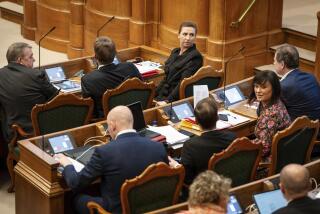Swiss voters OK ban on minarets
- Share via
Reporting from Paris — In a sign of latent fears of Islamic influence in Switzerland, voters on Sunday approved a constitutional ban on the construction of minarets on Muslim places of worship.
There are only four minarets atop mosques in the small Alpine country, but the two right-wing parties that sponsored the referendum cast it as a political question about the assimilation of Muslims into Swiss life.
The minaret “is a political symbol against integration; a symbol more of segregation, and first of all, a symbol to try to introduce Sharia law parallel to Swiss rights,” Ulrich Schluer said in a telephone interview. Schluer is one of the leaders of the Egerkingen Committee, which authored the bill, and a lawmaker from the conservative Swiss People’s Party.
Leaders of Switzerland’s Islamic community of about 350,000 people said they were baffled by the arguments of the referendum’s proponents and rejected equating minarets with Sharia, or Islamic law.
The minaret is “one part of our religion and culture, and we have the right to it,” said Mutalip Karaademi. Minarets are not used to call Muslims to prayer in Switzerland.
Karaademi, 54, a furniture salesman who also serves as leader of a Muslim cultural center, helped spark the debate. Several years ago he asked the northern town of Langenthal whether he could build a minaret on a mosque that serves nearly 3,000 families. Authorities initially approved it, but a backlash helped launch the referendum drive.
By taking their proposal to a national vote, the Swiss People’s Party and the Federal Democratic Union bypassed lawmakers’ attempts to shoot down the bill as discriminatory and unconstitutional.
Many such proposals in Switzerland’s system of direct democracy are turned down, but Sunday’s approval by 57.5% of voters illustrated an anxiety that the political establishment had underestimated, said analyst Lukas Golder of the political think tank gfs.bern.
“This is a sign that the issue was only covered on the surface, and now it has come up, and the political elite can see that the broader public perceives real problems about the integration of Muslims in our society,” Golder said.
The committee’s campaign used posters showing a Swiss flag pierced by black, missile-like minarets, and a woman in a full-body Islamic covering. The campaign fanned criticism that it would damage Switzerland’s international image and harm religious tolerance.
Initiative sponsors said they wanted to prevent Islamic extremism from seeping across the borders from other European countries with large Muslim populations.
“When you look at the European Union, where are there extremists?” asked Schluer. “In the suburbs and ghetto banlieues of Paris and London. . . . We don’t want that in Switzerland.”
He said Muslims were welcome in Switzerland but must assimilate into Swiss society.
In a statement, the Swiss Federal Council, a seven-member executive body, said it respected the decision of voters.
“Consequently, the construction of new minarets in Switzerland is no longer permitted,” it said, adding that the four existing minarets would be allowed to stand and that there was no prohibition on the construction of new mosques.
The ban will face legal challenges. Manon Schick, Amnesty International representative in Geneva, said banning minarets violates international law and guarantees of religious freedom.
Youssef Ibram, the head of a large mosque in Geneva, said he was stunned by the vote.
“I interpret this vote as the Swiss way of saying that the presence of Muslims here poses a major question,” he said.
Ibram’s mosque, which holds about 3,000 people during an average Friday prayer ceremony, was vandalized for the first time in more than 30 years as Sunday’s vote approached.
He said pink paint was splashed on the building facade, rocks were thrown at its entrance, and in a drive-by incident a fake Muslim call to prayer was recited over a loud-speaker.
Lauter is a special correspondent.
More to Read
Sign up for Essential California
The most important California stories and recommendations in your inbox every morning.
You may occasionally receive promotional content from the Los Angeles Times.










